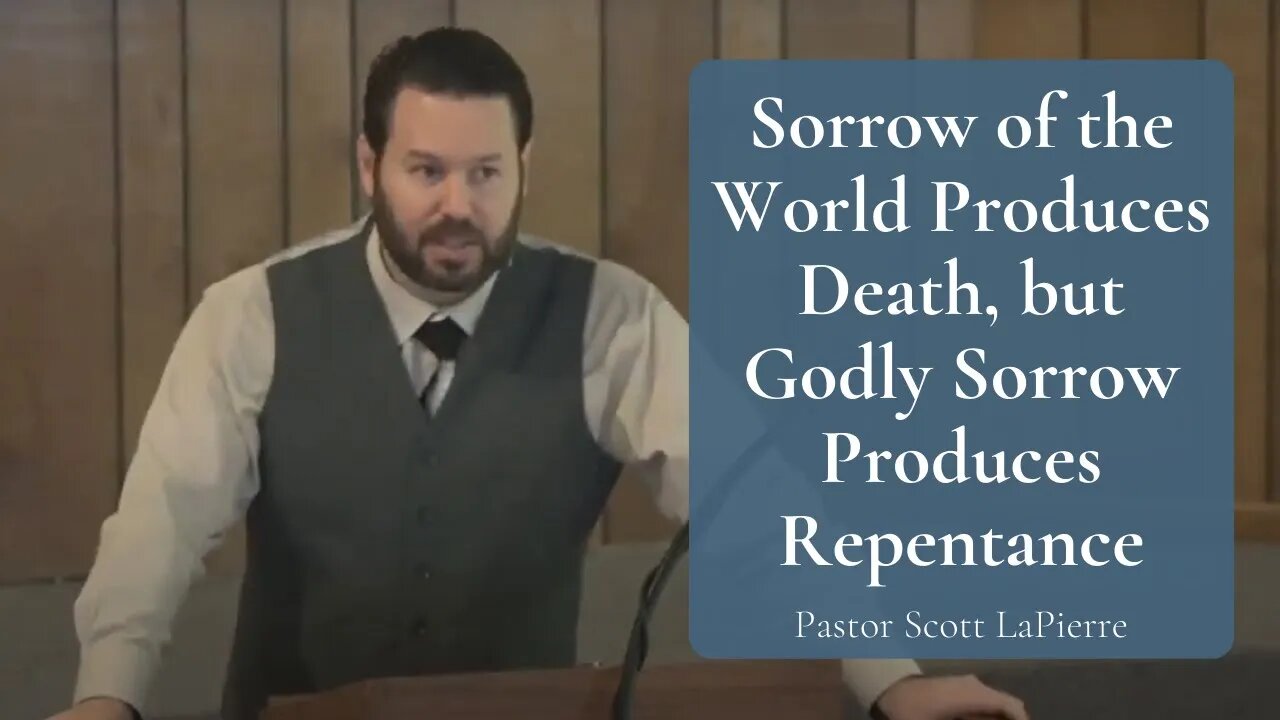Premium Only Content

Sorrow of the World Produces Death, but Godly Sorrow Produces Repentance - 2 Corinthians 7:10
Second Corinthians 7:10 says, " godly sorrow produces repentance leading to salvation, not to be regretted; but the sorrow of the world produces death." At different times people defend Judas, minimize his actions, and even claim he was a believer. It always relates to him bringing back the money saying he sinned, and showing sorrow over what he did. The problem is that Scripture discusses two types of sorrow: godly sorrow and worldly sorrow. Godly sorrow produces repentance leading to salvation, while worldly sorrow produces death. Judas committed suicide because he experienced so much sorrow. He shows us how not to deal with sorrow, and what we should do with sorrow instead.
Judas teaches an important lesson:
• Feeling bad about what we’ve done…
• Experiencing sorrow…
• Even feeling bad enough to commit suicide…
Doesn’t mean repentance has taken place. Only godly sorrow leads to repentance
Here's the accompanying podcast: https://www.scottlapierre.org/podcast/sorrow-of-the-world-produces-death/
Sermon Lessons for Worldly Sorrow Produces Death, but Godly Sorrow Produces Repentance - 2 Corinthians 7:10
Lesson 1: ____ __________________________ the consequences of sin (Matt 27:3-4; Jer 2:19).
Lesson 2: ______________ ______ isn’t repentance (2 Cor 7:10).
Lesson 3: Godly sorrow __________ to ____________ (Luke 13:1-3).
Family Worship Guide for Sorrow of the World Produces Death, but Godly Sorrow Produces Repentance - 2 Corinthians 7:10
Memory Verses: 2 Corinthians 7:10
Day 1: Matt 27:3-5, Jer 2:19, Pro 5:22 and discuss: What was the outcome of Judas’ betrayal that caused him remorse? What are some wrong choices you made still hoping for a favorable outcome? Can we ever go back and undo what was done? What does Jeremiah teach regarding the consequences of our sins? How does Proverbs describe the effects of the consequences of sin?
Day 2: 2 Cor 7:10, Matt 27:5, Psa 51:4, and discuss: What is the difference between worldly sorrow and Godly sorrow? Who is the offender most concerned about when he experiences Godly sorrow? Who is the offender most concerned about when he experiences worldly sorrow? What kind of sorrow did Judas display? Why is it important to discern who we are most concerned about being impacted by our sin? How will this help determine what kind of sorrow we are experiencing?
Day 3: Luke 13:1-5, Isa 59:2, Isa 55:7, and discuss: Referencing Luke 13:1-3, how can the events of the pandemic serve as a reminder about our need to repent of sin? What separates us from God? What promise is given to the one who forsakes his sin and turns to God? How should this motivate us to be quick to repent?
Receive a free copy of Scott's book, "Seven Biblical Insights for Healthy, Joyful, Christ-Centered Marriages": https://www.scottlapierre.org/subscribe/
For Scott LaPierre's conference and speaking information, including testimonies, endorsements, and contact info, please visit: https://www.scottlapierre.org/conferences-and-speaking/
If invited for a speaking engagement, you can expect:
• Professionally prepared and delivered messages
• A handout with lessons and discussion questions
• Copies of Pastor Scott's books to offer as gifts to increase registrations (if you desire)
• Advertising of your event on Scott's website and social media (if you desire)
• Facebook ads and/or a Facebook event page so the event can serve as an outreach (if you desire)
• Prompt responses to any communication
• Prompt replies to phone calls, emails, and/or text messages
-
 LIVE
LIVE
Candace Show Podcast
1 hour agoTrump Loses Control Of His Base. What Is He Hiding? | Candace Ep 217
4,241 watching -
 49:16
49:16
Kimberly Guilfoyle
4 hours agoSix Months In: The Trump Revival, Live with Bradley Devlin & Julio Gonzalez | Ep239
30.1K3 -
 1:13:53
1:13:53
vivafrei
2 hours agoMark Levin CHANGES TUNE? Adam Schiff Fraud EXPOSED! Canada Goes Full Anarcho-Tyranny AND MORE!
62.5K41 -
 2:03:35
2:03:35
Darkhorse Podcast
4 hours agoCan we have your liver? The 286th Evolutionary Lens with Bret Weinstein and Heather Heying
26K20 -
 11:12
11:12
Michael Button
7 hours ago $0.04 earnedWhy Göbekli Tepe WILL be Called Civilization (one day)
841 -
 LIVE
LIVE
LFA TV
19 hours agoLFA TV ALL DAY STREAM - MONDAY 7/21/25
1,485 watching -
 8:08
8:08
Faith Frontline
4 hours agoCharlie Kirk STUNS Student With PROOF That Christianity Is TRUE
34 -
 2:04:24
2:04:24
The Quartering
3 hours agoToday's Breaking News!
82.2K24 -
 UPCOMING
UPCOMING
Tim Pool
4 hours agoSin Frontera: The End of Illegal Immigration (DOCUMENTARY PREMIERE - 6pm EST)
11.8K2 -
 LIVE
LIVE
The HotSeat
1 hour agoTruth Bombs Drop on Obama’s Intel Mafia… But DOJ Still Smells Like Bondi’s Perfume
862 watching